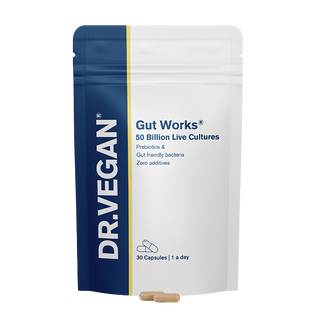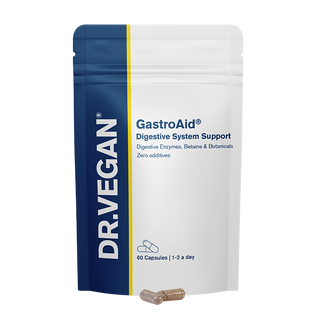The long-term effects of taking Proton Pump Inhibitors (PPI's)

Proton Pump Inhibitors (PPIs) are a class of medications designed to reduce stomach acid production by blocking the enzyme in the stomach lining responsible for acid secretion. They are commonly prescribed for conditions such as gastro-oesophageal reflux disease (GORD), peptic ulcers, and Zollinger-Ellison syndrome. Nearly one-quarter of adults in globally use PPIs on a regular basis and more and more questions are being asked about their long term impact and if PPIs are doing more harm than good?
Why are PPIs beneficial?
PPIs play a role in managing gastrointestinal (GI) conditions. Reducing stomach acid improves symptoms like heartburn, promotes healing of damaged oesophageal or gastric tissue, and prevents complications like ulcers or Barrett's Oesophagus. When prescribed for short-term use, they are highly effective and improve the quality of life for millions of people. The most popular PPI medication brands all end in 'prazole' and include Omeprazole, Lansoprazole, Esomeprazole, Rabeprazole, and Pantoprazole.
What causes the dysregulation of stomach acid and acid reflux?
There can be a number of causes of an imbalance or dysregulation of stomach acid and acid reflux. These include:
- Dietary factors and certain foods: This includes fatty foods and spicy foods, caffeine, tomatoes and alcohol.
- Obesity: This increases intra-abdominal pressure. Obesity is associated with a significant 1.5- to 2-fold increase in the risk.2
- Stress and anxiety: This can affect the way the vagus nerve acts, which in turn can affect acid dysregulation. Stress increases the risk by 1.9 times.2
- Not enough nutrients: Nutrients, including calcium, are needed for normal acid production and digestive processes.3
- Zollinger-Ellison syndrome: A condition where tumours grow in the stomach and duodenum, which can cause excessive acid production.
- Hypylori: Helicobacter Pylori is a bacteria that can live in the stomach. It can be responsible for gastric ulcers, acid reflux and indigestion. H.Plylori actually produces ammonium, which weakens stomach acid. They do this to aid their survival. The acid reflux associated with H.Plylori is due to the acid not being strong enough,4 and the body creating more volume of acid to compensate. The elevated pH resulting from ammonia production can disrupt the gastric mucous membrane,5 leading to conditions such as gastritis and peptic ulcers.
- An oversensitive oesophageal sphincter: An overly sensitive oesophageal sphincter may be the cause of acid reflux and can be caused by a range of factors such as neurological sensory dysregulation, inflammatory and autoimmune conditions, smoking and stress.
- Achalasia: Achalasia is a condition where the nerves in the oesophagus are damaged and as a result, cannot appropriately squeeze food into the stomach.
- Hiatus Hernia: A hiatus hernia is when part of the stomach moves up through the diaphragm. This can cause acid reflux and uncomfortable digestion.
- Gilbert's syndrome: Gilbert's syndrome is a genetic condition that affects the liver but can also cause acid reflux.
- Herpes: A herpes infection can affect the vagus nerve that controls digestion and can cause vagus nerve dysfunction6 leading to acid reflux.
How widely are PPIs prescribed?
PPIs are among the most commonly prescribed medications globally. Studies indicate that up to 10% of the Western population has used PPIs at some point, with annual prescriptions costing £12 billion. In addition to this, many people self-medicate with over-the-counter options. The British Medical Journal published a paper suggesting that over half of PPIs are taken without a valid medical reason7 or when it is not the most appropriate treatment for the patient's condition. A paper in a Swiss journal concluded that up to 65% of people taking PPIs had no reason to do so.8
Why is long-term use a concern?
PPIs are generally considered safe for short-term use when prescribed appropriately. Long-term use, however, may lead to significant risks and complications. These include:
Increased fracture risk: Long-term PPI use is a concern, as they reduce the body's ability to absorb minerals such as calcium, which increases the risk of low bone mineral density, which can result in bone fractures. A well-established and praised journal, the JAMA, published a study that found the long-term use of PPIs is associated with a 34% increased risk of bone fractures.8
Nutrient deficiencies: Unfortunately, it's not just the absorption of calcium that suffers from PPI use. The absorption of Iron and vitamin B12 is impaired,9 resulting in an increased risk of deficiencies. Vitamin B12 deficiency symptoms range from modest anaemia to severe neurodegenerative deficits.10 Iron deficiency symptoms can range from anaemia to cognitive decline.11
Kidney disease: Long-term PPI use may increase the likelihood of developing chronic kidney disease or acute kidney injury. Long-term use of PPIs has been associated with an increased risk of chronic kidney disease (CKD) and acute kidney injury (AKI). The National Institute of Health (NIH) published a meta-analysis that concluded that PPI use is associated with a 68 to 83% increased risk of AKI.12
Infection risk: Reduced stomach acid compromises the gut's natural defence mechanisms, making users more susceptible to infections like Clostridium Difficile. In 2012, the U.S. Food and Drug Administration (FDA) issued a safety communication indicating that the use of PPIs may be associated with an increased risk of CDI.13
Gastric atrophy: Continuous suppression of stomach acid can lead to a condition called atrophic gastritis, which may increase the risk of gastric cancer. A study published in Gut in 2020 found that new users of PPIs had a 45% increased risk of gastric cancer compared to users of H2 receptor antagonists (H2RAs). The risk increased with the duration of PPI use.
Imbalanced gut microbiome: Long-term use of PPIs can cause small intestinal bacterial overgrowth (SIBO).14 SIBO can then trigger bloating and increased intra-abdominal pressure, which can worsen reflux. The probiotics in our gut produce over 200 digestive enzymes, which is more than the human body produces. In cases of SIBO, when the gut microbiome is compromised, digestion is also disrupted and can create a viscous cycle. A healthy gut microbiome is essential for nutrient metabolism, nutrient synthesis and for the proper digestion of foods. Read more in 'why you should improve your gut health'.
What can be done instead?
For those with acid reflux, alternative approaches may offer relief without the risks associated with long-term PPI use. It is essential that if you are taking PPIs, you talk to your doctor first before deciding to wean off of them. There may also be an increase in symptoms when coming off PPIs, these include rebound reflux, which can be worse than the original reflux. DR.VEGAN® strongly advises that you work with your doctor and a Nutritional Therapy Practitioner or Functional Medicine Practitioner while on this journey.
The following should be considered:
- Get checked for H. Pylori: Helicobacter Pylori is a bacteria that can play havoc with digestion. It buries into the stomach wall, causes stomach ulcers and produces ammonium to decrease stomach acidity. One of the main symptoms is acid reflux. If you have H.Pylori, it needs to be treated.
- Weight loss if overweight or obese: even a small amount of weight loss can reduce intra-abdominal pressure and reduce acid reflux.
- Dietary changes: Keep a food diary and watch out for trigger foods. The most common trigger foods include spicy foods, chocolate, pizza, tomato and fried foods. Read more about the importance of your diet in 'how to look after your gut through your diet'.
- Eat small meals: Small and more frequent meals may reduce the risk of acid reflux as smaller meals reduce the pressure on the oesophageal sphincter.
- Meal timing: Ensure that your last meal is at least 3 hours before bed. This will ensure that most of the food in your stomach has moved on before you lie down.
- Take the right supplements: The right supplements can support digestion and ensure's that the acid in the stomach stays balanced.
-
Don't drink with meals: Stay hydrated by drinking in between meals. Drinking fluids with a meal is discouraged as it can negatively affect digestion. Sensitive individuals should even avoid soups and smoothies due to their liquid content.
Chew each mouthful of food 30 times before swallowing: It may seem like a lot to ask, but chewing food properly is essential. Chewing is not only one of the first parts of the digestive process; it also tells your brain that food is coming15. The body then prepares properly for incoming food. - De-stress: Stress is a significant factor in acid reflux. This is because the vagus nerve that controls digestion is highly susceptible to stress. In a DR.VEGAN® survey of 545 customers, 78% said they experienced feelings of stress or anxiety at least once a week*, suggesting that it controls most of our lives. Try stress-relieving techniques such as meditation, yoga and tai chi, all of which can help your body to process and manage stress better.
- Support digestion with the right food supplements: Supporting digestion is essential, especially for those with dyspepsia-related acid reflux. Digestive enzymes, digestive stimulant herbs and even betaine hydrochloride all help to support the right acidity level16.
View our range of award-winning probiotics, vitamins and supplements.
*This article contains data from UK surveys conducted by DR.VEGAN®. All survey findings reflect our own efforts and have not been influenced or verified by any external organisations or third-party entities.
You may also enjoy reading:
- Does menopause cause gut issues?
- 6 signs of an unhealthy gut
- Why your gut is your second brain
- Best probiotics for IBS
References:
-
Proton pump inhibitor use: systematic review of global trends and practices
- The association between symptoms of gastroesophageal reflux disease and perceived stress: A countrywide study of Sri Lanka.
- Gastric Acid, Calcium Absorption, and Their Impact on Bone Health:
- Helicobacter pylori moves through mucus by reducing mucin viscoelasticity
- Mechanism of Gastric Mucosal Damage Induced by Ammonia
- Herpes esophagitis: a comprehensive review:
- British Journal of General Practice
- Inappropriate proton-pump inhibitor prescribing in primary care – an observational study with quality circles
- Safety of long term proton-pump inhibitors: facts and myths
- The Effects of Proton Pump Inhibitors in Acid Hypersecretion-Induced Vitamin B12 Deficiency: A Systematic Review (2022)
- A Study of the Effects of Latent Iron Deficiency on Measures of Cognition: A Pilot Randomised Controlled Trial of Iron Supplementation in Young Women: https://www.mdpi.com/2072-6643/6/6/2419
- A Meta-Analysis of Proton Pump Inhibitor Use and the Risk of Acute Kidney Injury: Geographical Differences and Associated Factors:
- FDA Drug Safety Communication: Clostridium difficile associated diarrhea can be associated with stomach acid drugs known as proton pump inhibitors (PPIs)
- Proton pump inhibitor-induced gut dysbiosis and immunomodulation: current knowledge and potential restoration by probiotics: https://pmc.ncbi.nlm.nih.gov/articles/PMC10159235/
- Chewing and its influence on swallowing, gastrointestinal and nutrition-related factors: a systematic review
- Gastric Re-acidification with Betaine HCl in Healthy Volunteers with Rabeprazole-Induced Hypochlorhydria.



















